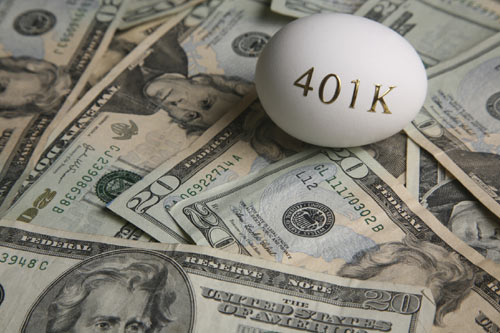
A little over one-third of the big Vanguard retirement-plan products are index funds, a concept with which the firm is synonymous. Also prominent on the list are Vanguard's target-date funds, a solid choice for investors who want a one-stop, no-fuss option. According to Vanguard, 88% of all the 401(k) plans it administers offer its Target Retirement funds as an investment option, and 66% of plan participants invest in one.
But Vanguard has many actively managed funds, and eight of them also appear on the list. Like all Vanguard funds, these eight carry extraordinarily low expense ratios, particularly for actively managed funds. Low fees aside, we wondered how good these funds really are, so we analyzed them, ranking each one "buy," "sell" or "hold." And for those funds that we rated hold or sell, we offer alternative suggestions.
Vanguard Wellington : BUY
Symbol: VWELX
Assets:
Expense ratio: 0.26%
1-year return: 11.1%
5-year return: 11.7%
10-year return: 8.0%
If you're looking for a good balanced fund for your 401(k), you won't do better than this one.
Vanguard Primecap: BUY
Symbol: VPMCX
Assets:
Expense ratio: 0.44%
1-year return: 17.9%
5-year return: 17.4%
10-year return: 10.5%
Our eyes are green with envy if your 401(k) plan includes this actively managed growth fund run by Primecap Management. This fund is closed to new investors, but that rule doesn't apply if it is offered in your workplace retirement plan. Buy shares in Primecap, and hold them for the long term. Over the past decade, the fund returned 10.5% annualized, an average of 2.5 percentage points per year better than Standard & Poor's 500-stock index.
Managers
Vanguard Windsor II: SELL
Symbol: VWNFX
Assets:
Expense ratio: 0.36%
1-year return: 13.4%
5-year return: 14.5%
10-year return: 7.2%
The knock on this fund begins with its motley crew of managers: 12 all told, from five money-management firms, including Vanguard's quantitative analysis team. Each firm runs a slice of the assets. The theory is that because each firm has a slightly different approach to picking undervalued large-company stocks--the fund's broad mission--the mix of managers will offer investors a smoother, more rewarding ride than a fund that was entrusted to one manager or investment firm.
The outcome so far is mixed. Over the past decade, Windsor II has been less volatile than other funds in its peer group--large-company value funds--and it returned an average of 0.6 percentage point more per year than the typical large value fund.
But Vanguard 500 Index (VFINX), which tracks Standard & Poor's 500-stock index and is another popular 401(k) fund, edged Windsor II by 0.6 percentage point per year over the past decade. And 500 was slightly less volatile, too.
Vanguard International Growth: HOLD
Symbol: VWIGX
Assets:
Expense ratio: 0.47%
1-year return: 1.7%
5-year return: 9.0%
10-year return: 6.7%
Strike one: a slew of recent manager changes--one manager joined in 2003, one in late 2009, another came in mid 2013, and yet another arrived in 2014. Meanwhile,
So why do we rate this fund a hold and not a sell? Since the financial crisis, something about the fund's menagerie management team has been working. Since the start of 2009, International Growth has posted an annualized return of 12.7%, way ahead of the 9.9% annualized gain of Vanguard Total International Stock Index (VGTSX), the typical foreign stock fund alternative in most 401(k) plans administered by Vanguard. This fund is worth holding if you already own it. We're hoping the game of manager musical chairs has ended, for now. Otherwise, go with the international index fund.
Vanguard Explorer: HOLD
Symbol: VEXPX
Assets:
Expense ratio: 0.51%
1-year return: 7.2%
5-year return: 17.7%
10-year return: 8.8%
This small-company fund is not a disaster, but neither is it something to write home about. If you have access to a small-company index fund, such as Vanguard Small Cap Index (NAESX), you may find it a better choice.
Explorer, run by managers from eight shops, including Vanguard's quant shop, tilts toward growing companies trading at a reasonable price. One new group has piqued our interest:
But that brings us to another concern: With
Vanguard Windsor : SELL
Symbol: VWNDX
Assets:
Expense ratio: 0.38%
1-year return: 13.0%
5-year return: 15.7%
10-year return: 7.1%
Don't confuse this fund with Windsor II. Though they both invest in bargain-priced, large-company stocks, the funds have different managers. Wellington Management, the fund's sole adviser from its inception in 1955 until 1999, still controls about 70% of the assets. That share is led by Wellington's
Like Windsor II,
Vanguard Morgan Growth: HOLD
Symbol: VMRGX
Assets:
Expense ratio: 0.40%
1-year return: 13.8%
5-year return: 16.3%
10-year return: 8.6%
This fund invests in large, fast-growing firms that have competitive advantages, strong balance sheets and smart executives. Over the years, like other Vanguard funds that are actively managed, it has been carved up among different firms--in this case, five, including Vanguard's quant group. The fund outpaced other funds in its category in six of the past 10 calendar years. But over the long haul, it has slightly trailed Vanguard Growth Index (VIGRX), which returned 9.2% annualized over the past 10 years. Plus, the index fund, with annual fees of 0.24%, is cheaper than Morgan Growth.
Vanguard Wellesley Income: HOLD
Symbol: VWINX
Assets:
Expense ratio: 0.25%
1-year return: 8.1%
5-year return: 9.6%
10-year return: 7.2%
Wellesley Income is essentially the mirror image of the fund we recommend, Vanguard Wellington. Both funds are run by Wellington Management in
Nellie S. Huang is Senior Associate Editor at Kiplinger's Personal Finance magazine.



 Contact The Editor
Contact The Editor
 Articles By This Author
Articles By This Author